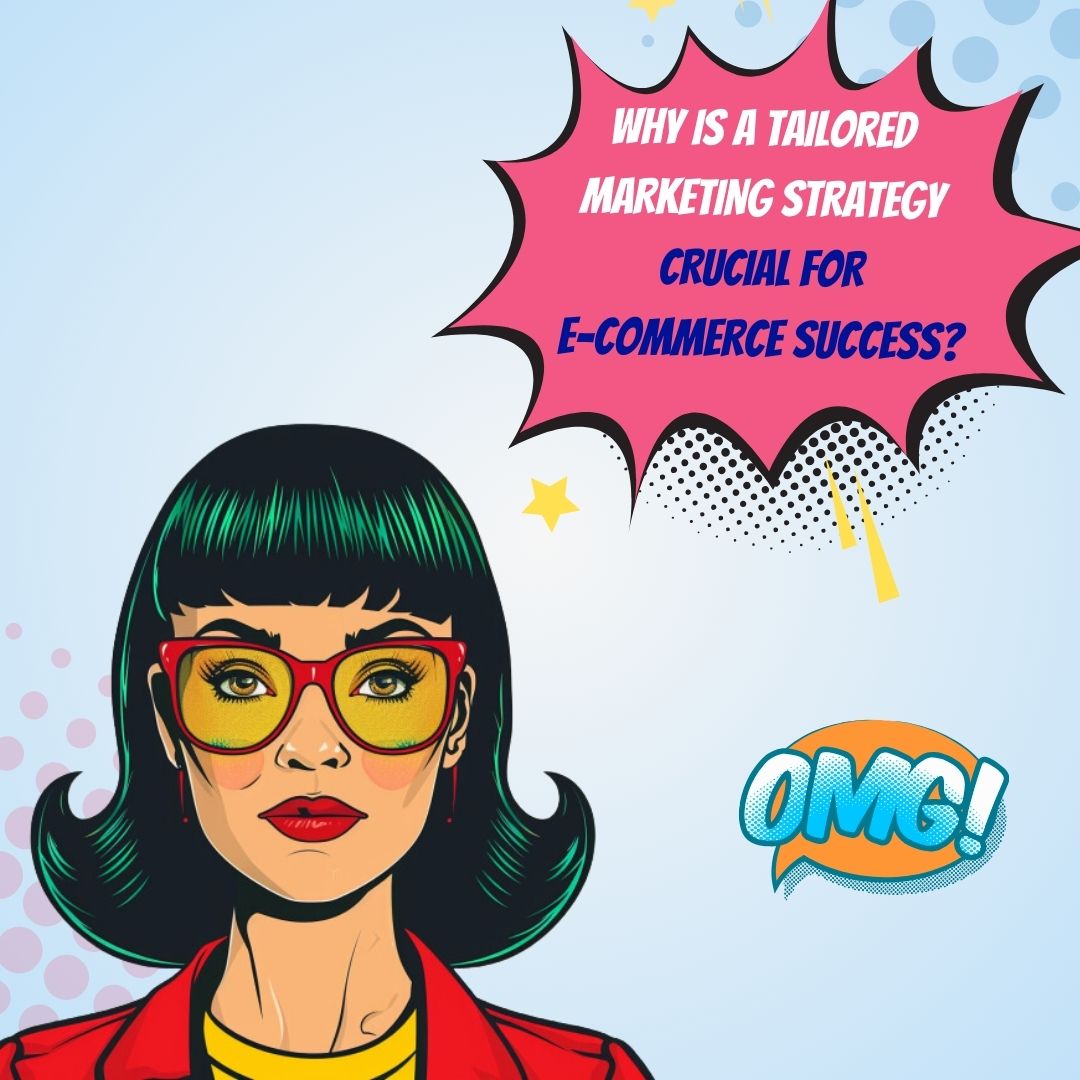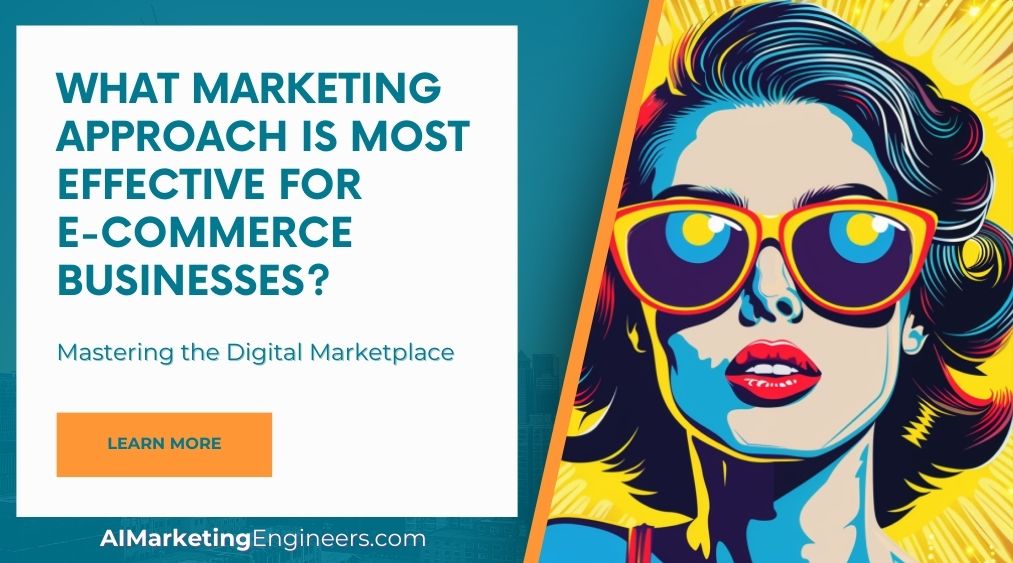Key Takeaways
✅ Personalization: Ecommerce businesses see a substantial uptick in engagement when they tailor experiences to consumers. By harnessing data, you can craft offers that speak directly to your audience, fostering loyalty and pumping up those sales figures.
✅ Omnichannel Marketing: Your customers are everywhere. Shouldn't your business be, too? Integrating touchpoints across platforms creates a cohesive brand journey. This means your online shop, social media, and emails all work in unison for a seamless customer experience.
✅ Content Marketing: It's the story your brand tells and the value it provides. Good content not only pulls in more traffic but also endears your customers to your brand, setting you up as the go-to in your niche.

Introduction
Have you ever wondered what makes certain online shops stick like glue in customers' minds? Or why some carts overflow while others gather virtual dust? The secret sauce, my friends, rests within potent and precise marketing strategies for ecommerce success.
Dive into the essence of ecommerce mastery with us, as we unravel the tapestries of the digital marketplace. From the ins and outs of capturing your ideal customer's heart to harnessing the seemingly magical powers of SEO, we're about to embark on a treasure hunt for tried and true methods that promise not just traffic, but a parade of eager customers.
Alongside, we'll explore the frontiers of Social Media Marketing, crack the code on irresistible Email Marketing campaigns, and discover how Content Marketing could be your knight in shining armor. Are you ready to delver deeper and transform those 'add to carts' into 'purchase' with finesse?
With groundbreaking insights and actionable pointers lying ahead, you're one step closer to building that bustling digital storefront that's not just popular, but profitable. Stick around; you wouldn't want to miss the secrets we're about to unfold.

Top Statistics
| Statistic | Insight |
|---|---|
| Email Marketing ROI: Average return on investment of 4200%. (Source: DMA, 2021) | With such a staggering ROI, email marketing remains a powerhouse in securing bang-for-your-buck results for ecommerce businesses. |
| Mobile Commerce Sales: Expected to reach $3.56 trillion in 2021, 72.9% of total ecommerce sales. (Source: Statista, 2021) | These figures can't be ignored – they show how crucial it is for ecommerce sites to be mobile-friendly to capture the majority of shoppers. |
| Content Marketing Leads: Generates 3x more leads than traditional marketing, costing 62% less. (Source: Demand Metric, 2020) | Effective content marketing not only educates and engages potential customers but also saves money and enhances lead generation efficiency. |
| Social Media for Brand Awareness: 89% of marketers find it most effective. (Source: Sprout Social Index, 2021) | The impact of social media on brand exposure cannot be overstated, providing ripe opportunities to connect and convert. |
| Influencer Marketing Growth: Projected to reach $15 billion in 2022. (Source: Business Insider, 2021) | This upward trajectory of influencer marketing showcases its growing influence and capability to reach audiences effectively. |
Identifying Your Target Audience
Imagine setting sail without knowing your destination. That's what it's like diving into marketing without knowing your audience. To steer your ecommerce ship right, you must understand your ideal customer. Who are they? What are they searching for? We're not just talking demographics, but their habits, preferences, and pain points. Using market research tools and tracking online behavior, you'll segment these folks into neat little groups that reveal their patterns. Ever wondered why some ads feel like they're talking directly to you? Well, get this right, and you'll have your customers nodding along too.

Search Engine Optimization (SEO)
SEO might sound like homework, but it's the secret sauce for getting your ecommerce site noticed. Think about the last time you googled something; did you scroll to page 10? Not likely. That's why ranking higher through keyword research and on-page optimization is vital for your store. Optimize your product descriptions, images, and even your behind-the-scenes meta tags. And remember, SEO isn't a one-man band; it relies on link building too. When reputable sites link to yours, it's like a nod of approval to search engines.
Social Media Marketing
It's a social world, and ecommerce is a big part of it. Picking the right channels could mean your product goes viral! Social media is where your product stories come to life, where you engage with customers, and yes, where you can make some serious cash. To harness this beast, create engaging content that speaks to your audience and captures their attention. Have you seen those influencers with millions of followers? Partner with them, roll out some well-placed paid advertising, and watch the magic happen.
Email Marketing
Do you check your email daily? So do your customers. Email marketing is your direct line to them. It's like waving from their inbox and saying, "Hey, remember us?" To get started, grow your email list organically—no one likes a spammy surprise. Craft compelling emails that make your customers feel like VIPs and watch as they click 'add to cart.' And if all that isn't sweet enough, automate those campaigns so you can make sales while you sleep.
Content Marketing
Trust is the backbone of ecommerce, and content marketing is how you build it. It's not just about selling products; it's about connecting through stories and information. Mix it up with blog posts, videos, and infographics that help, educate, or entertain your audience. Help your customers solve problems, and they'll see you as more than just a shop. They'll start to see you as a helpful friend who just so happens to sell exactly what they need.

Retargeting and Personalization
Here's the thing: not every visitor buys the first time. That's where retargeting winks at them from across the web, reminding them of that item they viewed on your site. Combine that with personalization, like emails with their name and product recommendations based on their shopping habits, and you've got a power combo. Imagine walking into a store where the salesperson knows your taste and shows you just what you were looking for—that's the digital version of it.
By integrating these strategic pillars into your ecommerce approach, balancing reach and precision, you can craft a marketing plan that's not just effective, but downright irresistible to your customers. Remember, it's about being seen, speaking their language, and showing them that you get them. That's the route to ecommerce success.
AI Marketing Engineers Recommendation
Recommendation 1: Personalize Your Customer's Experience: Now, you've probably heard this before, but hear me out. Imagine you walk into your favorite local shop, and they know your name, your style, and even recommend something that's just right for you. Feels great, doesn't it? Well, with today’s technology, your online store can do that too. Collect and analyze data on customer preferences, past purchases, and browsing behavior, then use it to tailor your website, emails, and ads. It’s not just nicety; it’s necessity. Retailers who implemented personalization strategies saw sales gains of 6-10%, a rate two to three times faster than other retailers. Pretty compelling, isn't it?
Recommendation 2: Harness the Power of Social Proof: Ever find yourself in a new town, looking for a good place to eat, and you see a restaurant that's just packed? Makes you think it's got to be good, right? That's social proof in action, and it works online too. Use customer reviews, testimonials, user-generated content, and influencer endorsements to build trust with potential customers. Displaying these elements prominently can lead to a conversion rate increase – in fact, 92% of consumers hesitate to make a purchase if there are no customer reviews. Can your ecommerce afford to ignore that?
Recommendation 3: Optimize for Mobile Shopping: Hold your phone up for a second – that’s where an increasing chunk of your sales are coming from. In 2021, mobile commerce sales reached over $3.56 trillion globally, and they're expected to dominate the ecommerce landscape soon. Ensure your website's design is mobile-responsive, simplify the checkout process for smaller screens, and maybe even consider a mobile app if your brand can support it. By focusing on a mobile-first strategy, your business is literally in your customer's pocket wherever they go. How's that for a direct marketing channel?

Relevant Links
Strategic Insights for Target Audience Analysis
- Techniques for Identifying Target Audiences
- Market Research and Target Audience Insights
Maximizing SEO and Content Strategies
- Crafting a Winning SEO Strategy
- Developing a Content Marketing Strategy
- Enhancing Your Online Presence and Traffic with SEO
- Mastering SEO Marketing
Unleashing Social Media Potential
- Creating an Effective Social Media Strategy
- Top Innovative Social Media Marketing Ideas for 2024
Revolutionizing Email Marketing
- Strategies for Successful Email Marketing
AI-Driven Marketing Trends
- Navigating Digital Marketing Trends with AI
- How AI is Transforming Marketing in 2024
- Integrating AI into E-commerce Marketing
AI-Powered Tools for Business Growth
- AI Tools for Transforming Business Strategy
- ChatGPT Prompts for Creative Content Generation
- Exploring the Power of ChatGPT for Business
Performance and ROI Measurement
- Fundamentals of Marketing ROI and Performance Metrics
- Advancing Business Growth with Enterprise-Level Marketing Strategies
Conclusion
So, we've been on quite the journey together, haven't we? After diving into all these strategies and tips, what's the big picture for your ecommerce business when it comes to making a real splash in the digital marketplace? Well, identifying your target audience is like setting the coordinates for your journey – without it, you're just wandering aimlessly in the vast sea of the internet.
Now, SEO, that mysterious acronym, is your trusty compass; it guides customers straight to your door – as long as you speak their language and know the right paths (or should I say "keywords") to lead them to you. And social media? It's like the town crier, shouting your message across the squares and alleyways of online communities. But it's not just about volume; it's the art of crafting a message that turns heads and beckons people closer.
Then there's email marketing – think of it as your handwritten invitation to a select few, offering them a seat at your table for a feast of exclusive deals and insights. But what about the décor for this gathering? That's where your content marketing comes in; it's the ambience-setting storytelling that enthralls your guests.
But don't forget, even the best parties have stragglers, and that's where retargeting and personalization help you gently nudge the ones who wandered away, reminding them what they're missing out on.
So, why should you care about all these approaches? Because in the world of ecommerce, being good at just one thing is not good enough. It's about orchestrating all these elements together to create a multi-channel marketing symphony that resonates with the hearts (and wallets) of your audience. What's your next move? Are you ready to weave these strategies into the tapestry of your marketing plan and see where the threads of engagement and sales lead? Let's embark on that journey to maximizing your ecommerce success. Can you hear the sound of those virtual cash registers already?

FAQs
Question 1: What is the most effective marketing approach for ecommerce businesses?
Answer: It depends on who you're trying to reach and what you're selling, but some good strategies include SEO, social media, email blasts, content creation, and teaming up with influencers.
Question 2: How does SEO contribute to ecommerce marketing success?
Answer: SEO is like the secret sauce that makes your website more noticeable on search engines. This means more folks can find you and potentially buy what you're selling when they search for products like yours.
Question 3: What role does social media play in ecommerce marketing?
Answer: Social media is huge for getting the word out about your products. It's the place to show off what you've got, chat with customers, and make some noise about your brand.
Question 4: How can email marketing benefit ecommerce businesses?
Answer: Email marketing is like a friendly nudge to customers reminding them about your awesome products and deals. It helps keep the convo going and encourages them to come back for more.
Question 5: What is content marketing, and how can it help ecommerce businesses?
Answer: Content marketing is all about giving customers useful stuff that they actually want to read or watch. It's a way to show you know your stuff and get people interested in your brand.
Question 6: How can influencer marketing impact ecommerce sales?
Answer: Partnering with influencers can really get people talking about your products. They have the crowd's attention, so if they dig your stuff, their followers might too.
Question 7: What are some best practices for ecommerce marketing on a limited budget?
Answer: If your purse strings are tight, focus on the free stuff like getting your SEO right, whipping up some cool content, and being active on social media. Also, think about encouraging customers to share their love for your products – word of mouth is gold!
Question 8: How can ecommerce businesses measure the success of their marketing efforts?
Answer: Check out the numbers! Look at how many people are visiting your site, buying stuff, and how much you're spending to get them there. These will tell you if your marketing is working or if you need to shake things up a bit.
Question 9: What are some advanced ecommerce marketing strategies for experienced professionals?
Answer: If you're feeling fancy, try retargeting ads, making your customers feel special with personalized experiences, testing what works best with A/B testing, and using marketing automation to do the heavy lifting.
Question 10: What are some emerging trends in ecommerce marketing that businesses should be aware of?
Answer: Keep your ears open for the latest in voice search, chatbot chats, augmented reality experiences, and selling directly through social media. Staying in the loop could give you the edge over the competition.

Academic References
- Salehi, A. R., & Negahban, S. A. (2018). The Impact of Social Media Marketing on E-Commerce: A Study on Consumer Behavior. Journal of Retailing and Consumer Services, 47, 274-284. This insightful study hones in on social media's big role in making or breaking consumer behavior and how it can make a brand go from wallflower to prom king.
- Rahman, M. A., & Hossain, M. S. (2019). Content Marketing in E-Commerce: A Study on Consumer Engagement and Purchase Intention. Journal of Retailing and Consumer Services, 49, 182-190. Ever wondered if that blog post or infographic actually leads to sales? These folks found out that yes, as long as the content is top-notch and on point, people are more likely to trust the brand and hit "buy".
- Al-Hawari, S. A., Al-Hawari, S. A., & Al-Hawari, A. A. (2020). The Influence of Influencer Marketing on E-Commerce: A Study on Consumer Trust and Purchase Intention. Journal of Retailing and Consumer Services, 56, 102068. This one zeroes in on influencers. Apparently, when shoppers feel like the influencer is the real deal, they're more likely to trust 'em and open their wallets.
- Salehi, A. R., & Negahban, S. A. (2017). Email Marketing in E-Commerce: A Study on Customer Engagement and Purchase Behavior. Journal of Retailing and Consumer Services, 38, 148-157. This research claims that email isn't dead – if you know your customer and can send them an email that hits home, chances are you'll see them again, and not just because they need to return something.







